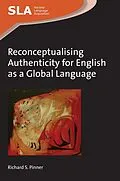This book examines the concept of authentic English in today's world, where cultures are in constant interaction and the English language works as a binding agent for many cross-cultural exchanges. It offers a comprehensive review of decades of debate around authenticity in language teaching and learning and attempts to synthesise the complexities by presenting them as a continuum. This continuum builds on the work of eminent scholars and combines them within a flexible framework that celebrates the process of interaction whilst acknowledging the complexity and individual subjectivity of authenticity. Authenticity is approached as a complex dynamic construct that can only be understood by examining it from social, individual and contextual dimensions, in relation to actual people. Authenticity is a problem not just for language acquisition but one which affects us as individuals belonging to society.
Autorentext
Richard S. Pinner is Assistant Professor in the English Literature Department at Sophia University, Tokyo, Japan and has taught in the field of ELT for over 10 years. His research interests include classroom practices and learner motivation, as well as authenticity and autonomy. He has published work in the ELT Journal, English Today, Applied Linguistics Review and Language Teaching Research.
Inhalt
1. Introduction to the Book
2. Existential, Philosophical and Theoretical Underpinnings
3. English as a Global Language
4. Authenticity in Language Teaching
5. The Authenticity Continuum
6. Authenticity in Bilingual Educational Contexts
7. New Media as a Catalyst for Authenticity
8. Conclusion
9. References
